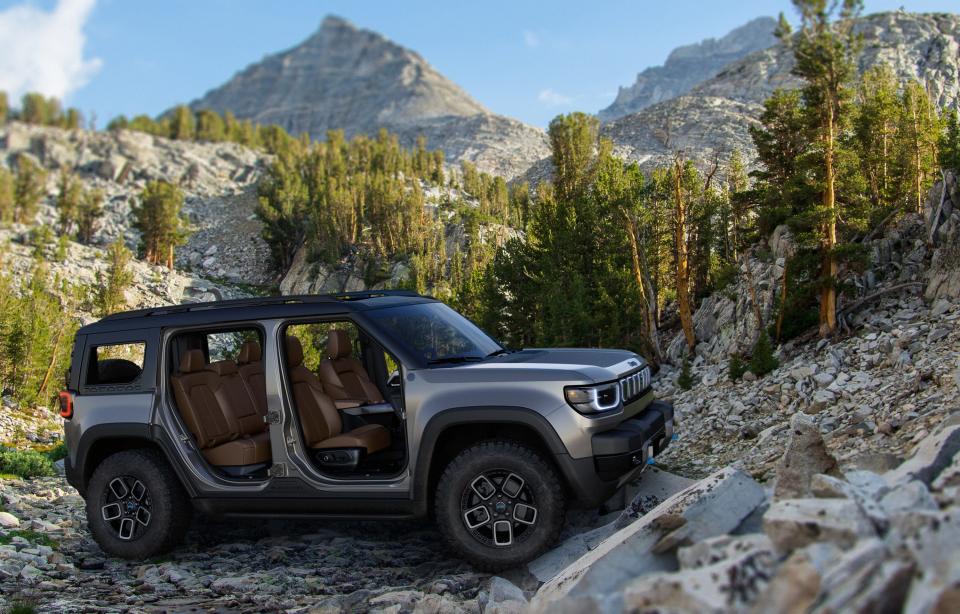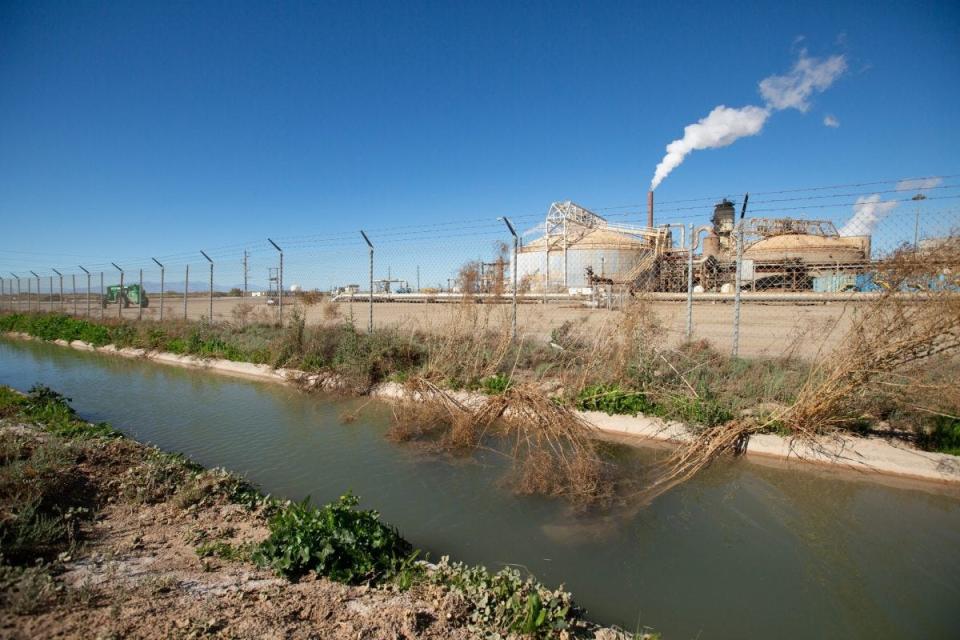Foreign investors, manufacturers eye Imperial County lithium production
Asian battery manufacturers, South American lithium miners and other investors are actively exploring Imperial County's nascent geothermal lithium extraction industry, as global and U.S. demand for the featherweight mineral used in electric vehicles and car phones explodes, area officials and business leaders say.
"We've had dozens of inquiries from other countries, and other states," said Eric Spomer, CEO of EnergySource Minerals, which is working on building the nation's first commercial-scale brine to lithium plant near Calpatria. He said visitors toting samples of their own geothermal brine, mostly from lithium-rich Argentina, Chile and Bolivia, arrive regularly to test the company's new technology to separate the mineral from brackish waters.
Major South Korean battery manufacturers and researchers are also scrutinizing planned production and development sites in what has been dubbed Lithium Valley, at the south end of the Salton Sea. No lithium is being produced commercially yet in this impoverished southeastern corner of California, and challenges remain, but one of the world's largest-known lithium reserves is here, two miles below ground in scalding, mineral-rich geothermal brine.
Prices for the mineral are skyrocketing, led by Chinese demand for millions of new electric vehicles. More state and national governments are adopting mandates to replace polluting gas cars and scale up renewables. Major automakers are pushing up their timelines for producing EVs.
Imperial County Supervisor Ryan Kelley said a delegation from a South Korean governmental research institute familiar with mineral extraction will be visiting Imperial County next week. He said he couldn't comment on potential manufacturers.
Rod Colwell, CEO of Controlled Thermal Resources, a second start-up lithium company working near the Salton Sea, said multiple OEMs — or original equipment manufacturers, as the battery makers are known — have also contacted them. "There is a lot of interest from the South Korean equipment manufacturers."
A range of options are being discussed, CTR officials said, including building a battery plant or plants next to the company's planned Iithium extraction and processing site, shipping the lithium and other valuable minerals to plants at other locations across the U.S., or both.

"CTR’s Clean Energy Campus model — where the entire battery supply chain is fully connected and runs on clean energy — is a very compelling model," said company spokeswoman Lauren Rose in an email. The proposed 7,000-acre campus, much of which still sits in shallow but rapidly evaporating Salton Sea water, could be powered by geothermal energy created on site.
Neither EnergySource nor CTR would provide names of potential customers or investors, citing confidentiality clauses in negotiations.
"CTR cannot name any companies at this time," said Rose. "This is a long process with significant due diligence for all parties to complete."
Colwell said it's "probably a couple of months before we paper up any deals, but there is strong interest from South Korea." He said any contracts would need to be finalized and jointly announced by CTR, auto companies and battery makers. He will visit South Korea next week, while other company executives meet with that country's researchers here.
Colwell's company has won backing from General Motors, which plans to stop producing gasoline-powered cars by 2035 and switch to EVs. Colwell's company, based in the city of Imperial and Australia, also has contracts with the parent company of Jeep and Chrysler (known as Stellantis), and European battery maker Statevolt, to use the lithium CTR produces.
Emails and calls to Stellantis and Samsung SDI, LG Energy Solution and SK On, three major Korean battery manufacturers who have announced billions in U.S. investments in recent months, were not returned.

Samsung SDI and Stellantis announced last October that they would form a joint venture to produce lithium ion batteries for plug-in hybrids and EVs at an undisclosed North American location to "fulfill the needs of Stellantis assembly plants throughout the U.S., Canada, and Mexico." It is targeted to start producing batteries in 2025.
That dovetails with projected commercial lithium production timelines for CTR and other would-be geothermal lithium developers in the Imperial Valley. EnergySource is aiming to begin construction of its fully permitted lithium extraction plant in November, though that timeline has been pushed back several times.
EnergySource is less dependent on construction here, because it can license its technology to would-be producers elsewhere. It recently announced a deal with a Utah-based lithium extraction company near the Great Salt Lake. The company is close to inking licensing deals with other companies to use its proprietary technology at sites elsewhere, Spomer said.
Full-scale production likely years away
Lithium, the lightest known metal, is a critical component in batteries used for everything from EVs to cell phones.
At least 15 million metric tons of lithium, in addition to other rare minerals, are available for extraction in Imperial County, California researchers estimate. That's enough to satisfy one-third of current global lithium demand, and up to a tenth of future demand. But the brine also contains iron and other deposits that can clog equipment "within days," said Spomer, a challenge that he said his company has conquered. But full-scale commercial production likely won't begin for at least two years in Imperial County.
Still, as EV production takes off, environmentalists are raising concerns about how current lithium mining methods require significant water consumption and can result in the destruction of sensitive habitats. Production is also usually powered by polluting gas or coal-fired electric sources.
Geothermal power, while not free of pollution, creates far fewer emissions than those dirty sources While lead and other toxics are present in the brine, advocates say they can be contained as part of "closed loop" systems and re-injected underground.
Separating lithium out of the brine is also potentially less environmentally damaging to wildlife, habitat and nearby communities than hard rock lithium mining in Australia, South America, and at a small Nevada site, or huge Chilean evaporation ponds that waste water.
Federal incentives seen as critical
But hurdles remain. EnergySource recently lost a deal with another producer that said it needs technology suitable to cooler liquid. (EnergySource disputes that is the reason the deal didn't go through and says its technology works in cool brine.)
And company executives say wooing investors to a state with high taxes and tough environmental laws is tough. They said a new federal law that could offset some of the California costs is welcome and is fueling interest.
Incentives tucked into the Inflation Reduction Act passed by Congress and signed by President Joe Biden last month are driving demand across the U.S., as foreign and domestic manufacturers and investors seek to capitalize on rebates and tax breaks. They could be a major boost for Imperial County and its would-be lithium producers, who are eager to see a complete logistics and supply chain, from mineral extraction to battery production, auto manufacturing and battery recycling.
Biden has repeatedly stressed the importance of increasing domestic production of critical minerals and materials to reduce the country’s dependence on imports. At his request, Energy Secretary Jennifer Granholm toured the Salton Sea region in April, and promised battery funding opportunities and community input.
“The energy security piece of things is so fundamental, and that this region could play an important role in making the United State’s clean energy independence is so very important,” Granholm said when she visited.
The Inflation Reduction Act extended $7,500 rebates for new EVs. Depending on when the car is made and purchased, the law sets out certain requirements, such as final assembly in North America or a certain percentage of the critical minerals in the EV being produced in the U.S. or one of its free-trade partners. The aim is to spur and reward domestic mineral production and vehicle assembly.
Other incentives, like investment tax credits for mineral production, are slated to be implemented too.
Colwell, Spomer and elected officials said such incentives could be "huge" drivers of lithium development in Imperial County, which has among the highest unemployment rates in the state.
CTR's Colwell said: "We still don't know the full language ... but once the language comes out and assuming production is linked to a federal investment tax credit, that would be huge."
"That would encourage manufacturers from the United States, from South Korea and wherever to build out their supply chain here," he added. "It is massive, that's a big deal for us, but we still are still trying to understand what the actual numbers are."
U.S. Rep. Raul Ruiz, D-Palm Desert, pushed hard for the energy provisions in the Inflation Reduction Act, as well as clean-up funds for the badly polluted Salton Sea.
Ruiz spokeswoman Kelly O'Keeffe said: “The congressman welcomes and has in fact pushed for global investment in the lithium at the Salton Sea. His number one priority is that any investment happens with community consultation, that local communities see the benefits, and that local residents fill the jobs at potential manufacturing sites.”

In addition to CTR and EnergySource, which are wrapping up test projects and pushing forward with construction plans, Berkshire Hathaway Energy Renewables, a subsidiary of Warren Buffet's investment and energy company, is conducting pilot projects to scale up the separation of lithium from brine that is pumped up from its existing geothermal steam-fired power plants. Berkshire Hathaway Energy Renewables did not respond to several requests for comment.
Kelley and Colwell both said they've been monitoring deals that are being struck among auto companies and South Korean battery makers in other states and Canada, including Indiana, Kentucky, Georgia and Windsor, Ontario, a few miles across the border from Detroit.
"Kokomo! Yes, I read about it," said Kelley, referring to an announcement in May by Chrysler parent Stellantis and South Korea's Samsung SDI that they will invest more than $2.5 billion and create 1,400 jobs at a planned electric vehicle battery plant in Kokomo, Indiana.
Battle over state tax continues
Despite the international interest, Colwell and fellow CTR executives have also been lobbying officials in Sacramento to rescind a per ton tax on produced lithium passed this summer, which they say has already cost them some projects and is driving major investments to other states.
County officials and community and environmental justice groups pushed for the tax, with 80% of the revenues slated to go to different towns and critically needed infrastructure, and 20% to fund restoration projects at the fast-drying Salton Sea.
But Colwell said, "80% of nothing is nothing," stressing that major companies could see the tax as too big a cost and locate elsewhere.
Spomer with EnergySource said California's per-ton tax was a shock that has added costs right as his firm is finalizing financing to construct what will be the lithium geothermal brine extraction facility. But he said as long as the revenue will go to local communities and Salton Sea cleanup, his company is not fighting it.
One potential battery maker has announced plans to locate in Imperial County to date. The founding CEO of Italian battery manufacturer Italvolt announced in April that he's formed a new company, Statevolt, that will build a new $4 billion, 54-gigawatt-hour facility. The "gigafactory" aims to produce enough batteries for 650,000 electric vehicles a year and create up to 2,500 jobs. The specific location of the facility has not been announced.
Under a signed letter of intent, Controlled Thermal Resources will deliver lithium and geothermal power from its planned Hell's Kitchen lithium and power project to Statevolt.
Coldwell said the engagement from other countries is welcome.
"We have had a lot of interest for a long time, but it has never been as strong as it is now, that companies genuinely want to come to the valley and genuinely build facilities, hopefully in California, not in Texas or wherever they normally go."
Janet Wilson is senior environment reporter for The Desert Sun, and co-authors USAToday's Climate Point newsletter. She can be reached at jwilson@gannett.com or @janetwilson66 on Twitter
This article originally appeared on Palm Springs Desert Sun: Foreign investors, manufacturers eye Imperial County lithium production
